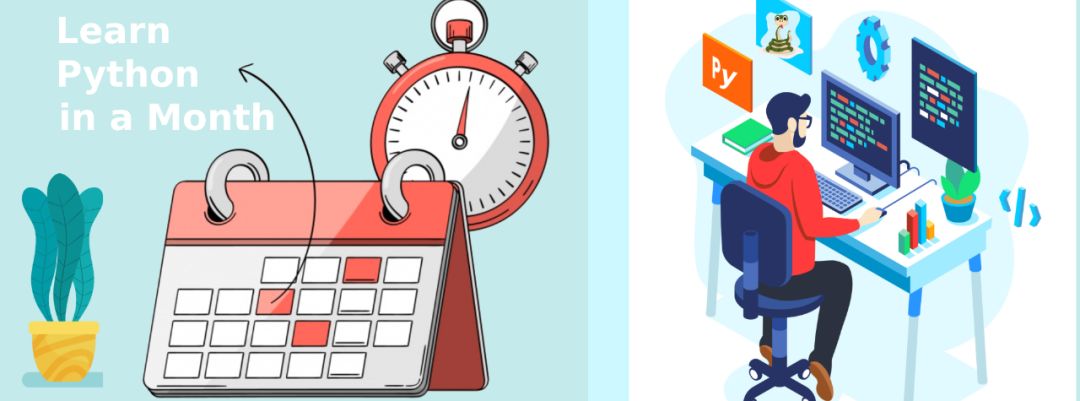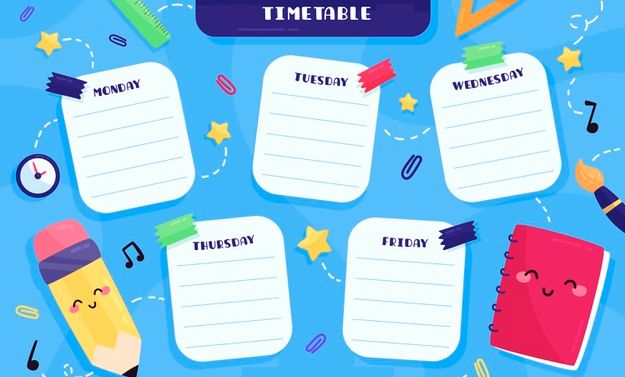Follow 👆 the public account and reply with 'python' to get a beginner's tutorial! Source from the internet, will delete if infringedUndoubtedly, Python is one of the hottest programming languages today. For many ‘novices’ who have never ventured into computer programming, mastering Python in depth seems like a daunting task. In fact, as long as you master a scientific learning method and develop a reasonable study plan, you can go from beginner to proficient in Python in just one month!

-
Familiarize yourself with basic concepts (variables, conditions, lists, loops, functions)
-
Practice over 30 programming problems
-
Complete two projects using these concepts
-
Familiarize yourself with at least 2 frameworks
-
Start using integrated development environments (IDEs), GitHub, hosting, services, etc.

-
Day 1:
Basic concepts (4 hours):print, variables, input, conditional statements
-
Day 2:
Basic concepts (5 hours):lists, for loops, while loops, functions, importing modules
-
Day 3:
Simple programming problems (5 hours):swap two variable values, convert Celsius to Fahrenheit, calculate the sum of digits in a number, determine if a number is prime, generate random numbers, remove duplicates from a list, etc.
-
Day 4:
Intermediate programming problems (6 hours):reverse a string (palindrome check), calculate the greatest common divisor, merge two sorted arrays, guess the number game, calculate age, etc.
-
Day 5:
Data structures (6 hours):stacks, queues, dictionaries, tuples, trees, linked lists.
-
Day 6:
Object-oriented programming (OOP) (6 hours):objects, classes, methods and constructors, inheritance in object-oriented programming
-
Day 7:
Algorithms (6 hours):searching (linear and binary search), sorting (bubble sort, selection sort), recursive functions (factorial, Fibonacci sequence), time complexity (linear, quadratic, and constant)
-
Day 1:
Familiarize yourself with an IDE (5 hours):an IDE is your operating environment when writing large projects, so you need to master one IDE.In the early stages of software development, I recommend you install the Python extension in VS Code or use Jupyter notebook.
-
Day 2:
GitHub (6 hours):Explore GitHub and create a code repository.Try committing, viewing changes, and pushing your code.Also, learn how to work with branches, how to merge different branches, and how to create pull requests in a project.
-
Day 3:
First project – Simple Calculator (4 hours):Familiarize yourself with Tkinter and create a simple calculator
-
Days 4, 5, 6:
Personal project (5 hours each day):Choose a project and complete it.If you don’t know what to do, you can check the list below (https://www.quora.com/what-some-good-python-projects-for-an-middle-programmer/answer/jhankar-mahbub2)
-
Day 7:
Host project (5 hours):Learn to use servers and hosting services to host your project.Create a Heroku setup and deploy the application you built.
Week 3:Become a Programmer
-
Day 1:Database Basics (6 hours):
Basic SQL queries (create table, select, where queries, updates), SQL functions (Avg, Max, Count), relational databases (normalization), inner joins, outer joins, etc.
-
Day 2:Using Python with Databases (5 hours):
Utilize a database framework (SQLite or pandas), connect to a database, create and insert data into multiple tables, and read data from tables.
-
Day 3:APIs (5 hours):
How to call APIs.Learn JSON, microservices, and REST API.
-
Day 4: Numpy (4 hours):
Familiarize yourself with Numpy (https://towardsdatascience.com/lets-talk-about-numpy-for-datasciences-beginners-b8088722309f) and practice the first 30 Numpy exercises (https://github.com/rougier/numpy-100/blob/master/100_numpy_excercises.md)
-
Days 5, 6:
Portfolio website (5 hours each day):Learn Django, use Django to build a portfolio website (https://realpython.com/get-start-with-django-1/), and also learn about the Flask framework.
-
Day 7:
Unit testing, logging, debugging (5 hours):Learn unit testing (PyTest), how to set up and view logs, and use breakpoint debugging.
-
Day 1:Prepare Resume (5 hours):Create a one-page resume.Summarize your skills at the top, and make sure to include a GitHub link when writing projects.
-
Day 2:Portfolio Website (6 hours):Write a few blogs and add them to the portfolio website you developed earlier.
-
Day 3:LinkedIn Profile (4 hours):Create a LinkedIn profile and put all the content from your resume on LinkedIn.
-
Day 4:Interview Preparation (7 hours):Prepare some common interview questions from Google, practice 10 programming problems from the white paper.Check previous interview questions on sites like Glassdoor and Careercup.
)
Python has become the language closest to top financial institutions
If you want to seize the opportunity in this year’s autumn recruitment and get an Offer
Mastering Python is urgent!
The era of numbers has already arrived
Learning some programming early is the way to go!
Whether you are a data novice or a data enthusiast with some foundation
Python Financial Data Practical Training Camp
Can help you quickly master the essential Python skills for the financial industry
The Tsinghua male god teacher personally leads the team,15 days: theory + practical teaching
How to Obtain:
-
Like + View Again
-
Reply ‘python’ in the public account
Receive the latest 2024 Python zero-based learning materials,Reply in the background:Python